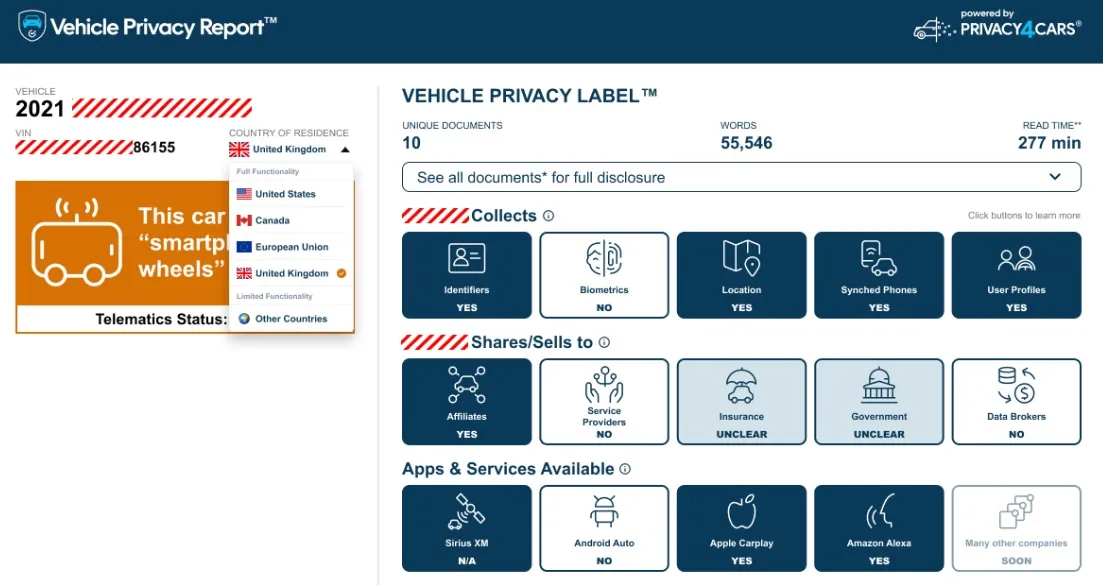February 9, 2024 | Becoming Invisible, Part 12: Even Your Car Is Spying On You

Say you want to organize an anti-war rally or buy some controversial medicine. You’re reluctant to do this from home, where Google and Amazon are listening and (possibly) forwarding your plans to all the acronym agencies.
So you round up your co-conspirators and hop in your car for a ride, during which you plan your transgressions.
You just made a huge mistake because your car is listening to every word you say and selling your data to the highest bidder. Here’s how that works:
Today’s new cars come with “infotainment systems” which monitor everything occupants do, say, or touch, and GPS systems that record where a car goes and how long it stays there. And if you sync your phone with your car, the car can and probably will access everything that’s on your phone, including texts, emails, voice messages, and pictures.
According to privacy-oriented browser company Mozilla:
Tesla is only the second product we have ever reviewed to receive all of our privacy “dings.” (The first was an AI chatbot we reviewed earlier this year.) Nissan earned its second-to-last spot for collecting some of the creepiest categories of data we have ever seen. It’s worth reading the review in full, but you should know it includes your “sexual activity.” Not to be outdone, Kia also mentions they can collect information about your “sex life” in their privacy policy. Oh, and six car companies say they can collect your “genetic information” or “genetic characteristics.” Yes, reading car privacy policies is a scary endeavor.
And it’s getting worse. Vehicles manufactured after 2026 will be required to “passively monitor the performance of a driver of a motor vehicle to accurately identify whether that driver may be impaired, and prevent or limit motor vehicle operation if an impairment is detected.”
Autonomous robo-cars, meanwhile, will have multiple internal and external cameras that are always on and recording — and sharing customer data with advertisers and law enforcement. As the San Francisco police department recently noted, self-driving cars “are recording their surroundings continuously and have the potential to help with investigative leads.” In other words, they’re a “mobile surveillance platform.”
Corporate and government AIs will use this data to construct “Minority Report” style profiles that predict our actions or expose our secrets. For example, if your car makes multiple trips to a medical specialist, the data-mining AI might conclude that you’re suffering from a specific disease, a fact that, under HIPAA, is supposed to be private. But the car companies are free to sell that data to marketers or give it to the government.
And don’t forget that cars, like any other computer, are hackable. In 2022, the personal information of 18,000 Nissan owners was exposed, with virtually no public debate.
What Can We Do?
The more advanced cars become, the harder it is to parse and manage their privacy implications. As Telsa says:
If you no longer wish for us to collect vehicle data or any other data from your Tesla vehicle, please contact us to deactivate connectivity. Please note, certain advanced features such as over-the-air updates, remote services, and interactivity with mobile applications and in-car features such as location search, Internet radio, voice commands, and web browser functionality rely on such connectivity. If you choose to opt out of vehicle data collection (with the exception of in-car Data Sharing preferences), we will not be able to know or notify you of issues applicable to your vehicle in real time. This may result in your vehicle suffering from reduced functionality, serious damage, or inoperability.
The two most obvious suggestions for preserving car privacy are:
- Don’t sync your phone with your car unless you’re fine with General Motors selling your texts and pics to Amazon or giving them to the FBI.
- Watch what you say and do in your car. Remember the multiple cameras and mics, and behave as if you’re in full public view.
I’ll keep digging, with the goal of posting a future article with more sophisticated solutions. In the meantime, there’s a service called Privacy4Cars that offers general and specific information on how various cars collect and use data:

Give Privacy4Cars your vehicle’s VIN and it will generate a report on which apps are running and how the data is handled. For example:

Related Articles
What Data Does Your Car Gather About You and Where Does It Go? This Tool Shows You
It’s Official: Cars Are the Worst Product Category We Have Ever Reviewed for Privacy
Experts say modern cars can violate consumer privacy
Videos
STAY INFORMED! Receive our Weekly Recap of thought provoking articles, podcasts, and radio delivered to your inbox for FREE! Sign up here for the HoweStreet.com Weekly Recap.
John Rubino February 9th, 2024
Posted In: John Rubino Substack











